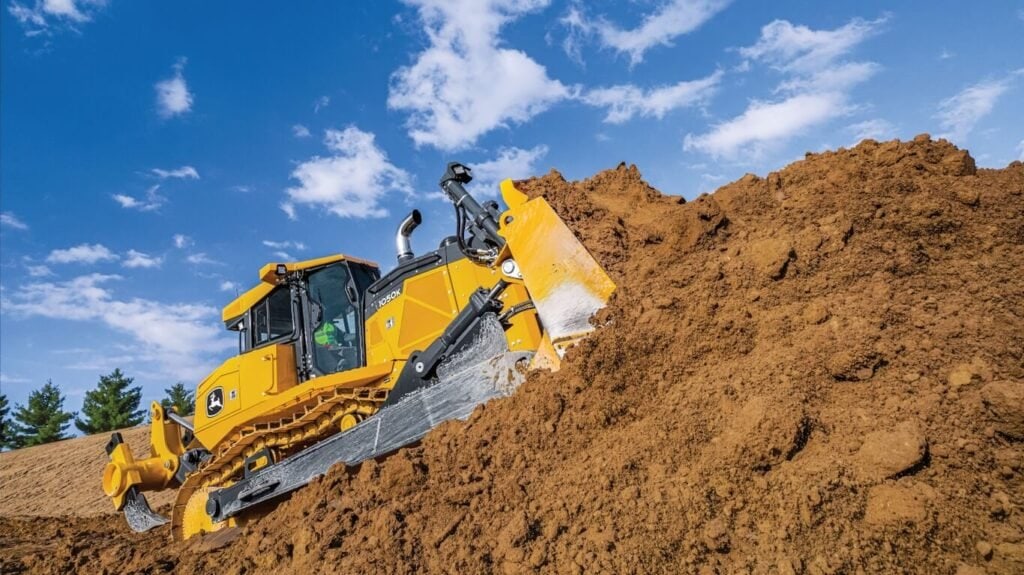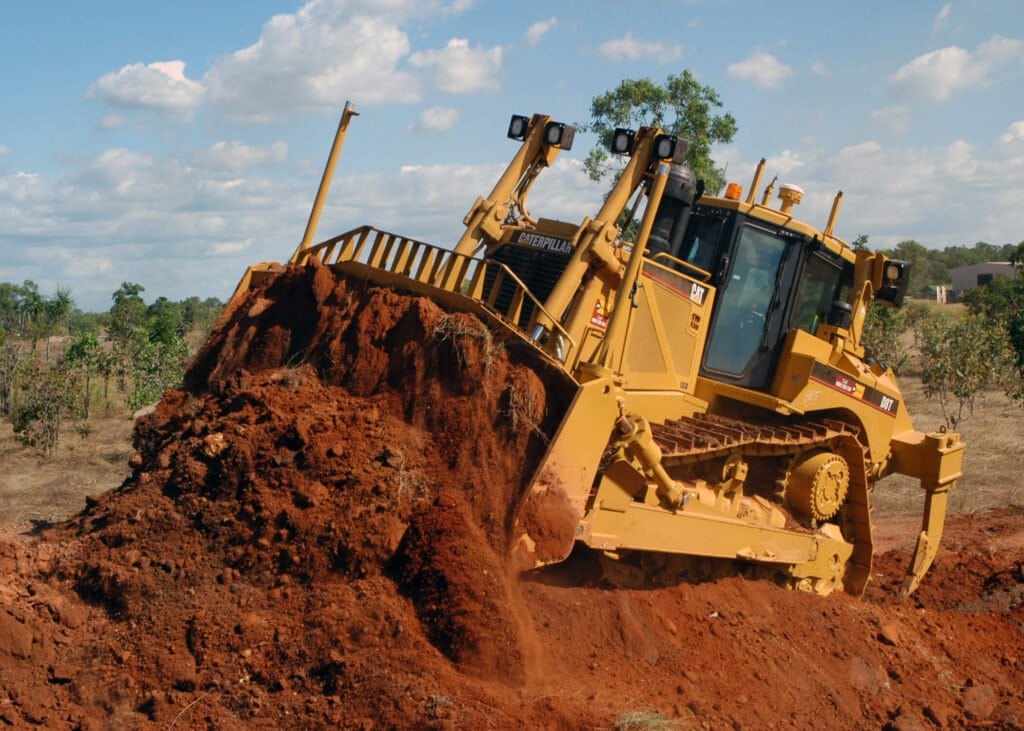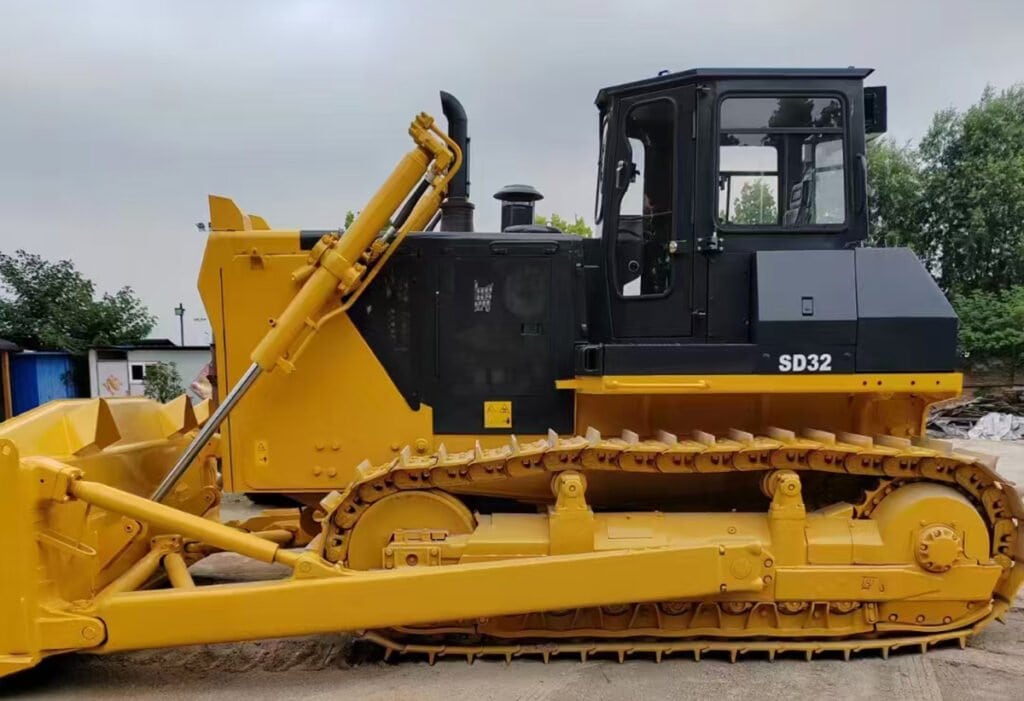Most people appreciate the strength of a bulldozer, but few truly understand its full application in construction, mining, and demolition.
A bulldozer is mainly used for land clearing, road building, excavation, demolition, and mining. Its strong blade and tracks make it ideal for pushing soil, rocks, and debris efficiently.
Now, let’s explore each step in detail for smarter excavator purchases.

How Are Bulldozers Used In Land Clearing?
Land clearing is the first step in almost any construction project, whether it’s for a house, a road, or a mining operation. Until the land is prepared, nothing else can happen. This is where the dozer shines. These machines are designed to slash through the jungle, remove trees, brush, and other debris, pushing obstacles out of the way that would take weeks if not months to do by hand.
Another benefit to using bulldozers for land clearing is it saves time and money. It takes forever to cut down 100 yards of jungle by hand. A dozer operator can chew through 100 yards of brush, trees, and rocks in a day. These machines are great for pulling stumps and pushing over trees. The dozer with the rakes on the back does an excellent job of grubbing out roots and packing the dirt if you plan on running a scraper over it or something else that requires a firm, smooth surface.
Considering the 10 uses of bulldozer, land clearing always comes first. Even the 5 uses of bulldozer lists have land clearing. Bulldozers are more effective on a large scale than an excavator when you need to push rather than dig. This is a big selling point for those who export used bulldozers because people involved in agriculture and forestry need a reliable machine to clear ground.
The efficiency of bulldozer application in land clearing impacts the entire project timeline. Clearing vegetation with a bulldozer saves labor costs, reduces fuel compared to multiple smaller machines, and ensures a flat, stable surface for construction. Whether in urban areas or remote farmland, the uses of the bulldozer often overlap with construction, proving its versatility.

Why Are Bulldozers Essential In Road Construction?
Roads are the lifeblood of any economy. For roads to last, they need a strong foundation. A bulldozer makes sure that the ground is prepared, the soil is compacted, and the surface is stable before concrete or asphalt is applied. Without this preparation, roads fail.
For highways as well as rural roads, bulldozer equipment spreads gravel, levels the soil, and maintains the correct slope. It’s not just about power; it’s about precision when you’re using a bulldozer. The operator can dial in the blade to cut or fill soil to create the exact grade that’s needed before paving begins. The tracks on the construction equipment bulldozer serve as an advantage over a wheeled machine because it won’t sink in as quickly if the subsoil in the fill is soft.
In many projects, the bulldozer is the first equipment to arrive and is used to build temporary access roads for other equipment. For those buyers considering a used bulldozer, road construction is often one of the top applications because there is always work to be found.
Different types of bulldozers come into play here. Smaller units are effective for street preparation in urban areas, while larger bulldozer types take care of highway construction and massive earthworks. The reliability of these machines is what keeps projects on schedule. In a third-world country where logistics can be a nightmare, the use of bulldozers in road construction is even more critical. Delays can have massive economic impacts.

What Role Do Bulldozers Play In Mining And Excavation?
When mining, you have to move a tremendous amount of dirt and rock. That’s where the bulldozer excels. Bulldozers strip the overburden off the valuable minerals. Their ability to push material long distances makes them invaluable.
Bulldozer application in mining also include maintaining haul roads, keeping access routes open for trucks, and keeping them fed with material. If the roads are muddy and impassable, production stops. Bulldozers also help with excavation, cutting, and leveling ground, especially in open-pit mining operations.
The uses of bulldozer in construction often overlap with mining, because in both cases you need something that’s tough and has lots of pushing power. The people who buy used bulldozer equipment find it especially valuable in mining environments. Even though the machine is used, it can still push stuff around and take a beating if properly maintained. As a matter of fact, a lot of exporters point out that CAT, Komatsu, and Sany bulldozers are known for surviving in some of the harshest mining environments on earth.
Different bulldozer types have unique roles. A bulldozer with claw (ripper) breaks apart hard soil or rock before the blade pushes it away. Larger construction bulldozer models are built to withstand continuous operation in dusty, rocky terrains.
Downtime is expensive in the mining industry. One reason is that bulldozers are so rugged and tough; they don’t break down. You need them to help continually move dirt, rock, and tailings piles along with the excavators and loaders. In mining, they’re not so much about bulldozing as they are about keeping your operation running smoothly.

How Do Bulldozers Help In Demolition And Site Preparation?
Before you can build something new, you often have to get rid of what’s old, and that’s where bulldozers come into play. In regards to demolition and site preparation, a bulldozer is not a specialized demolition machine like a wrecking ball. However, on small to medium size projects, a bulldozer’s versatility can be beneficial.
In the demolition of small buildings and walls, a bull dozer is used to knock things over and push rubble out of the way. If the bull dozer has a claw on the back of it, the claw is used to rip and tear through concrete or asphalt surfaces. Once the claw has done its work, the main blade on the front of the bull dozer can be used to push rubble out of the way. After the demolition, the same piece of bull dozer equipment is used to prepare the site for future construction by leveling the ground.
This mix of demolition and site preparation makes bulldozers a cost-effective option. For companies in the market to buy a used bulldozer, this versatility means one machine can do several different tasks, saving on the initial capital investment.
It is more practical and cost-effective to utilize a bulldozer on projects where budgets are tight than to invest in a specialized demolition machinery. Once the debris is cleared, the bulldozer can then be used to compact the soil to get it ready for foundations, roads, and several other construction projects.
When we look at the 5 uses of bulldozer, demolition and preparation are often combined. A bulldozer won’t replace a dedicated demolition maquinaria in a large city. But in an under-developed area where you don’t have a lot of other options, it’s your best bet. And, site preparation is just one more reason why bulldozers are critical to the construction industry worldwide.

Do I Need A License For A Bulldozer?
Operating a bulldozer is not like driving a car. You need a special license or heavy equipment certification in most countries (or at least you should!). This not only teaches you how to operate the equipment properly, but also how to do so safely.
The need for a license is based on the potential danger. A bulldozer can be dangerous in the wrong hands. That’s why most (if not all) governments require training for anyone who wants to operate one. Again, if you’re buying a used bulldozer, make sure you know the local laws before you turn one of your employees loose with it.
Rules and regulations can vary. In some countries, a person can operate a bulldozer with some training and supervision. In other parts of the world, there are formal courses that must be completed. As the construction market in the Middle East and South America continues to expand and more infrastructure projects are undertaken, there will be more demand for certified operators.
As an exporter of construction equipment such as bulldozers, it’s important to educate your buyers on these requirements. They may not be allowed to run a bulldozer on a job site without the proper certification. They may need a license to operate that bulldozer, and that license is not only for compliance, but it’s also going to make your machine last longer because a trained operator is going to be easier on your machine than an untrained operator.
So, while the uses are endless at the end, if it’s illegal to run it without a license, they’re going to have to have a licensed operator. They’re going to have to make sure they’re legal to operate that thing. They’re going to have to have the license when they get it.

What Should You Not Do In A Bulldozer?
Safety is a top priority when handling a bulldozer machine. There are specific actions that operators must avoid to ensure safe work.
First, you don’t want to push your bulldozer past its capabilities. You can damage the engine, the hydraulics, and everything else if you try to do too much. Second, don’t try to drive it up or down hills that have a high probability of turning you over. Third, don’t fail to do your daily inspections. Check the oil, the tracks, and the condition of the blade.
Using a bulldozer in construction calls for discipline. Misuse can slow a project down and drive up your costs if you have to repair behind somebody. Oh, and one other thing. Don’t transport personnel in your bulldozer. The cab is designed for one person only.
When operated correctly, it works efficiently. If operated incorrectly, it will soon be parked. Even if you buy a used bulldozer, it’s still a good one as long as you and your people know how to operate it correctly. If you’re going to buy a bulldozer, you would need to train your people on how to operate it, and how not to operate it.
The manufacturers’ guidelines for using bulldozers emphasize proper loading, proper use of the blade, and slow, steady control. If you don’t pay attention to these guidelines when using a bulldozer, you’re likely to have an accident and probably an incident that could lead to injury or downtime.
Knowing what not to do with a bulldozer is just as important as knowing what to do with a bulldozer. Safe use keeps it running longer.

Are Bulldozers Hard To Operate?
Here’s a question I often get asked by new buyers: Are bulldozers difficult to use? The answer is that it depends on the training and the type of machine. When talking about a traditional bulldozer, you have to have some skill. You’re working two different controls: the blade and the tracks. It takes a lot of coordination, especially when you’re trying to level ground or work on slopes. For a beginner, it feels complex. But the truth is, once you’ve been trained properly, it’s not difficult to run a bulldozer.
Bulldozers today have user-friendly controls. These machines oftentimes will have GPS in them to help guide you, and you can set them to automatically blade. You can do all kinds of things. The technology makes them easy to use. A person doesn’t get as fatigued operating this equipment all day because of the smooth ride and the air-conditioned cab. The technology is such that an untrained person can do a pretty good job with new construction equipment.
Now, don’t get me wrong, bulldozers are not toys, and you do have to know what you’re doing. You need to learn how to use them in a safe manner. They take some patience and practice, and training courses help. In these courses, you learn how to run the blade and use a bulldozer to build a road or clear land.
If you’re buying a used bulldozer rather than a new one, the learning curve might be a little steeper because many of the older models don’t have all of the advanced controls. But a lot of contractors like the older machines because they’re tough and a little cheaper. Are bulldozers hard to operate? The answer is no. Once you’re trained, you can run a bulldozer. You get good at fast running a bulldozer.

What Is The Lifespan Of A Bulldozer?
One concern people have is how long the thing will last. They are not cheap, but a dozer will last you a while. It is not unusual for a bulldozer that is well taken care of to last at least 10 to 15 years if not longer. It just depends on how hard it is worked and where it is run. If you buy a used bulldozer and do your due diligence with an inspection prior to your purchase, a used dozer will serve you well.
Caterpillar (CAT), Komatsu, and Sany are good brands. They make a good, tough dozer, making brands like CAT bulldozers a preferred option. Regular maintenance, using the proper parts, and doing things according to the manual and specs will make bulldozers last pretty much indefinitely.
If you were operating a bulldozer in mining, where things are brutal, you could burn one out in a year. However, a bulldozer doing light work in agriculture, like clearing land, will last for quite a while.
Exporters make a big deal about how long these machines last. When you’re buying a bulldozer, you will pay a premium to buy one that lasts. You have to balance the initial price versus how long it’s going to last. A used CAT may outlive a brand-new cheap Chinese bulldozer.
In summary, the use of a bulldozer depends on how well it’s maintained. With good maintenance, it is not just a tool—it’s a long-term investment.
ملخص
Bulldozers are versatile. They are tough. In construction, mining, and agriculture, there’s nothing more efficient than a bulldozer in the right hands and properly maintained.